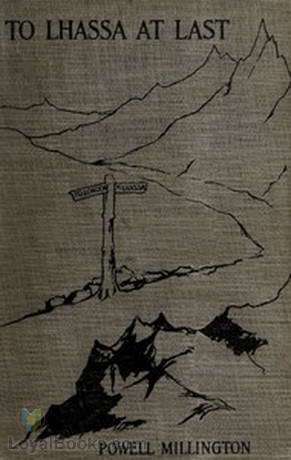To Lhassa at Last By: Powell Millington |
|---|

In "To Lhassa at Last" by Powell Millington, readers are taken on a remarkable journey through the treacherous terrain of the Himalayas, as the author fulfills his lifelong dream of reaching the elusive city of Lhassa. This captivating travelogue offers a unique window into the mystifying beauty and cultural richness of Tibet, while also delving into the enduring human spirit.
Millington's writing style is both vivid and poetic, painting a vivid picture of the majestic landscapes that unfold before the senses. Each page is imbued with his evident passion for exploration, as he deftly describes the awe-inspiring mountain ranges and the ruggedness of the trails he traverses. His ability to convey the sights, sounds, and even scents of the region is truly remarkable, allowing readers to feel as though they are accompanying him on this daring expedition.
Beyond the physical journey, however, lies a much deeper exploration of the spiritual and cultural essence of Tibet. Millington delves into the country's rich history, delving into the ancient traditions and teachings that have shaped the lives of its people for centuries. His encounters with local monks and spiritual figures offer readers a glimpse into the complex and profound belief systems that underpin Tibetan society.
What sets "To Lhassa at Last" apart from other travel narratives is the author's introspective exploration of his own motivations and fears throughout the journey. Millington reveals his innermost thoughts and vulnerabilities, making him a relatable and genuine narrator. His personal growth and transformation are just as compelling as the physical challenges he faces, as he confronts his own limitations and learns to adapt to the remote and unforgiving landscape.
As the narrative unfolds, readers become engrossed not only in Millington's personal journey but also in the broader questions the book raises. It prompts reflection on themes such as the exploration of the unknown, the importance of perseverance, and the resilience of the human spirit. The author's descriptions are rich in detail, enabling readers to visualize the scenes and immerse themselves fully in his experiences.
Although the book may have benefited from a more structured narrative and some additional historical context, "To Lhassa at Last" is undeniably a captivating read. It appeals not only to travel enthusiasts but also to those seeking a deeper understanding of Tibet's cultural and spiritual heritage.
In conclusion, Powell Millington's "To Lhassa at Last" is a compelling and enlightening travelogue that transports readers to the heart of Tibet. Through mesmerizing prose and vivid descriptions, Millington captures the essence of the region's beauty, spirituality, and its people. This book is a testament to the power of exploration, resilience, and the enduring human spirit. Variations in spelling and hyphenation have been retained as in the original. Some typographical and punctuation errors have been corrected. A complete list follows the text. Words italicized in the original are surrounded by underscores . The 'oe' ligature is represented as oe. The asterism sign is represented as []. TO LHASSA AT LAST [Illustration: LHASSA. From a photograph. By permission, from "Black & White" ] TO LHASSA AT LAST BY POWELL MILLINGTON AUTHOR OF 'IN CANTONMENTS' 'IN AND BEYOND CANTONMENTS' ETC. Far hence, in Asia, On the smooth convent roofs, On the gold terraces Of holy Lassa, Bright shines the sun. MATTHEW ARNOLD WITH A FRONTISPIECE SECOND EDITION LONDON SMITH, ELDER, & CO., 15 WATERLOO PLACE 1905 [ All rights reserved ] TO CAPTAIN S. H. SHEPPARD, D.S.O. R.E. A COMRADE IN TIBET AND ELSEWHERE THIS BOOK IS DEDICATED BY THE AUTHOR November 1904 PREFACE When the Sikkim Tibet Mission Force marched to Lhassa, it carried along with it, besides fighting men and diplomatists, a strong contingent that represented literature and the deeper sciences... Continue reading book >>
|
| eBook Downloads | |
|---|---|
|
ePUB eBook • iBooks for iPhone and iPad • Nook • Sony Reader |
Kindle eBook • Mobi file format for Kindle |
|
Read eBook • Load eBook in browser |
Text File eBook • Computers • Windows • Mac |
| Review this book |
|---|